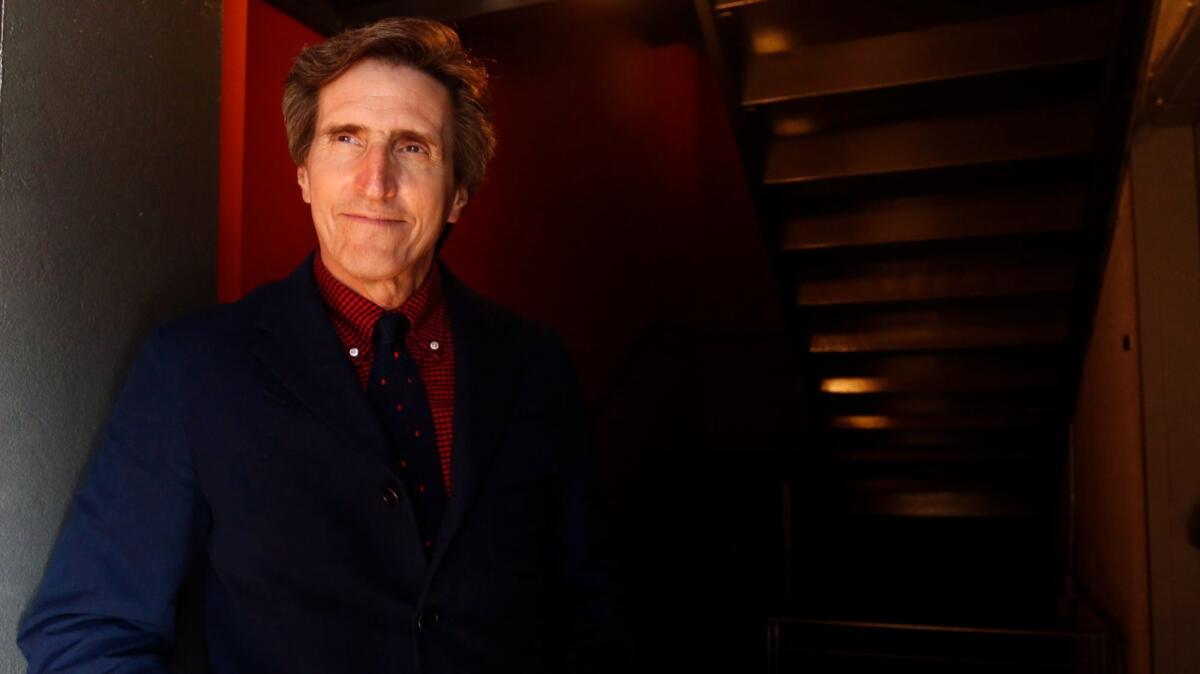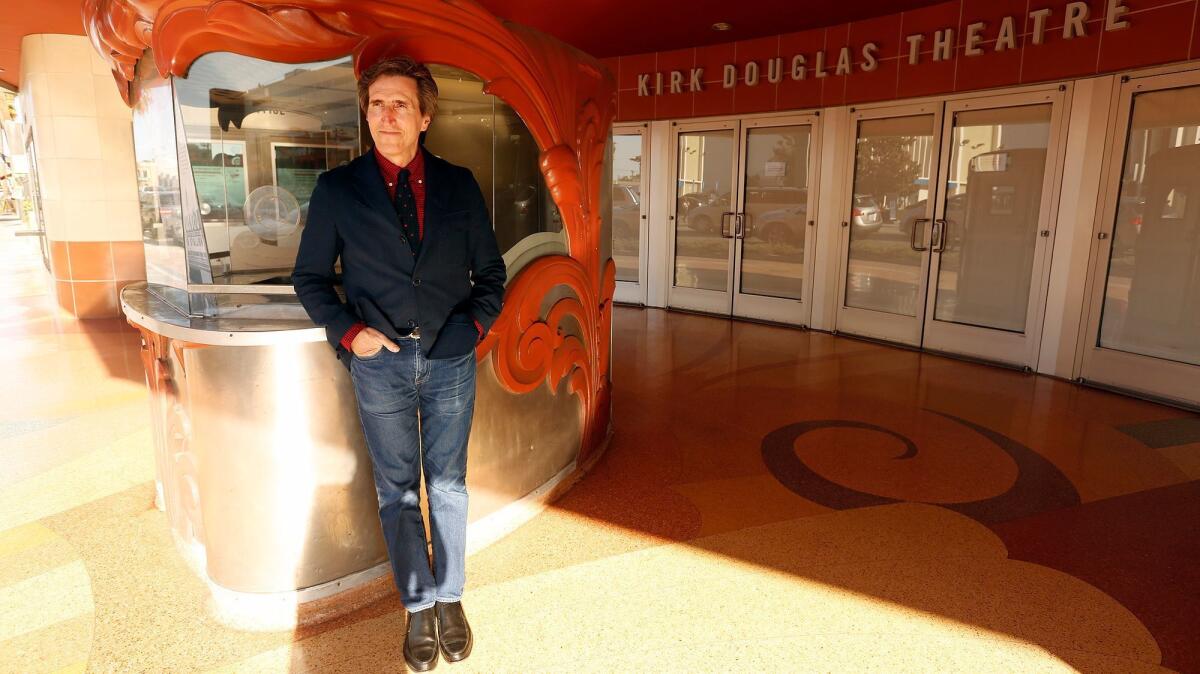Q&A: Paul Rudnick on ‘Big Night,’ Hollywood and his See’s Candies L.A. diet

- Share via
Paul Rudnick’s latest play, “Big Night,” is having its world premiere at the
Rudnick, 59, seems cheerfully determined not only to find the silver lining in every cloud but also to convey the essential absurdity and wonder that coexist in those clouds. A conversation is a string of quips like, “The only upside of Trump is that he’s given us back
Through a career writing plays, screenplays, novels, essays, New Yorker “Shouts & Murmurs” columns and a Twitter feed bristling with exuberance, Rudnick hasn’t lost his faith in the value of a good joke. “People throughout history always say, ‘How can you write comedy anymore? Reality has so outdistanced satire!’” he says. “You think, ‘Nah — it’s still good stuff.’”
Wendie Malick is not only one of the funniest actresses on the planet, she can also turn on a dime and be gut-wrenchingly moving. You want to keep her onstage.
— Playwright Paul Rudnick
“Big Night” is a showbiz comedy, set on Oscar night, as a hardworking, undersung actor prepares for his life to change. Rudnick loves writing about actors, he says, not just because they tend to be dramatic but because show business is a universal language. “The farmers in Omaha and the factory workers in Minnesota know what the grosses were for the No. 1 film that weekend,” he says. “The world has become a gossip column. Who has not advised Brad and Angelina from their laptop?”
Rudnick is happiest in the theater, which he describes as “a very particular addiction.” But that doesn’t mean he can’t find those shreds of happiness elsewhere — including Culver City, as he effuses in this edited conversation.
What inspired you to write “Big Night”?
I had been working on another play that was actually set on Oscar night, but I put it aside because it still felt a little lightweight, and I always think that the best comedies come from the highest possible stakes.
And then the 2016 Tony Awards occurred on the same night as the shootings in Orlando. And there were discussions of canceling the awards. Did it somehow seem like an insult, was it obscene to celebrate in the face of that scale of tragedy? The decision was made to forge ahead, but with an awareness of the larger world. They took the rifles out of the “Hamilton” number, and William Ivey Long, the brilliant costume designer who is also designing the costumes for “Big Night,” made the decision to provide silver ribbons for everybody who appeared.
And it’s a gesture. Maybe it’s never enough. But you think, “OK, people needed to show some awareness, some sense of, ‘No, this is no longer just a party.’” And when I thought about tragedy at that level, with people who spend their lives entertaining audiences — how do you cope with the existence of true horror in the world, when you’re at a moment of peak happiness? Can your sense of humor survive, can your love for the people around you survive, when suddenly the world makes absolutely no sense? On Oscar night! I’m limiting the summary to avoid spoilers, but that’s the teaser.
You write in so many genres. How do you decide, when you wake up in the morning, whether you’re going to write a play or a movie or a novel?
One of the very few things I have learned in life is to let the material dictate the form. When I have an idea, I think, “What does it want to be?” There are some subjects where you think, “This is worth a column, but not two hours of an audience’s time.” When an idea that seemed genuinely theatrical presented itself, it was a thrill because that hadn’t happened in a while.
You’re a New Yorker, but you stayed in L.A. for rehearsals. How has that been?
I’ve never stayed in Culver City before, and I love it. The neighborhood is beautiful, and we’ve been exploring all the restaurants.There’s a level of enchantment that you rarely get working in the theater. In New York, I’m on the subway. Here, I stroll over. And the Douglas — when I walk in, it feels like a theater in a movie, which always feels far too glamorous and far too deluxe, but that’s what this theater is actually like. I feel a little Disney about the whole thing. I love having Los Angeles as a character in the play, and Culver City has just been a joy, so I’m recommending it to everyone. And all the natives keep telling me, “You know, it didn’t used to be that way.” They keep saying, “This is recent.” And I appreciate that. That they prepared it for my arrival.
You’re known for eating mostly junk food. How has your diet been received out here?
We have some cast members that are still trying to convince me to eat fruits and vegetables and gluten-free whatever. I am their ultimate obstacle, and I will win. I like to tempt them right back and bring them cookies. If you put a cookie a few inches away from the most strict vegan, they will eat it. No one has that kind of willpower. And I always feel like the very finest drug dealer, where it’s like, “Here, have a Snickers.” And they go, “No, no, no! Do you know what’s in that?” And I say, “Yes. Happiness. Pleasure.” I love being able to provide forbidden pleasures to audiences, or actors. But I always caution them that you can’t mix foods. You have to eat pure, refined sugar all day long. The minute you add a grain, or a meat product, you’re dead.
Have you found any temptations unique to Los Angeles?
Well, everything is so universal now. You can go to your Le Pain Quotidien, your Coldstone Creamery, and I’m very grateful for that. … See’s! Of course! What am I saying? I discovered See’s very early in my trips to Los Angeles, and it was ground zero. It has that hand-dipped quality that reminds me of one of my great childhood fantasies. You know at the Hostess Cupcake factory, the white squiggle on the cupcake? I always dreamed that I could put my mouth under that squiggle machine, and it would probably kill me. But with a smile.
If you put a cookie a few inches away from the most strict vegan, they will eat it. No one has that kind of willpower.
— Paul Rudnick

Did you revise the “Big Night” script during rehearsals?
Oh, constantly. I live to rewrite. Especially when I’m working with a world-class director like Walter Bobbie, who can guide me and who can be also brutally honest. You should never regard your work as precious and golden and untouchable. That’s the worst mistake a writer can make — especially if you’re writing comedy, where the audience is your partner, and if it’s not funny, you can’t just yell at them. You can’t take out a gun and say, “You’d better laugh” — much as I’ve considered that.
The actors are a constant inspiration, because they’re so gifted that if they have a problem with a line or a scene, it’s my fault. They can make anything work, but they shouldn’t have to. So when I see them struggling, I think, “OK, that’s what I need to fix.” And when they do something wonderful, I think, “I’m going to give them more of that.”
My greatest nightmare is that I will have an early draft of something and I’ll be hit and killed by a bus, and someone will find that draft and imagine I thought it was good.
You should never regard your work as precious and golden and untouchable. That’s the worst mistake a writer can make — especially if you’re writing comedy.
— Paul Rudnick
That’s why rehearsal and revision are so important. It’s a process, and everyone who works on new plays has to enjoy doing that. I once wrote a play and I came in with rewrites and told an actress, “Your character is now a hunchback.” And she looked at me like, “I’m going to kill you.” And she ended up being magnificent, and she got to have a lot of hunchback humor.
You need actors of this caliber who can show you where this play wants to go. Wendie Malick is not only one of the funniest actresses on the planet, she can also turn on a dime and be gut-wrenchingly moving. You want to keep her onstage forever because she’s such gold. And in this play, she’s also staggeringly beautiful. She wears a floor-length William Ivey Long sequined gown, and no one has ever worn a gown this beautifully before. And then she turns around and you see the back. When Wendie and Kecia Lewis stand next to each other in their gowns, you think, “OK, the world is the most beautiful place.” I like taking credit for things, like, “I wrote that. I wrote those stunning, gifted actresses in those William Ivey Long gowns. Yeah.”
Is there a point where the cast says, “No more changes”?
Where they rip it out of your cold, dead hands? There is a point where you have to stop, where revision can become a little less productive. That’s why someone like Walter Bobbie is so valuable, because he’ll just say, “Paul, stop.” And sometimes I’ll say, “Oh, can’t I just write three more jokes here?” And he’ll say, “No, you can’t.” Sometimes literally slapping the pen out of my hand. And I think, “Thank you for that.” It becomes like an intervention.
♦ ♦ ♦ ♦ ♦ ♦ ♦ ♦ ♦ ♦
‘Big Night’
Where: Kirk Douglas Theatre, 9820 Washington Blvd., Culver City
When: 8 p.m. Tuesdays-Fridays, 2 and 8 p.m. Saturdays, 1 and 6:30 p.m. Sundays; ends Oct. 8 (call for exceptions)
Tickets: $25 to $70 (subject to change)
Info: (213) 628-2772 or www.centertheatregroup.org
Running time: 1 hour, 25 minutes (no intermission)
Support Times coverage of the arts. Share this article.
MORE THEATER:
Review: Open Fist’s ‘Walking to Buchenwald’
Review: Tarell Alvin McCraney’s ‘Head of Passes’
Review: ‘Please Excuse My Dear Aunt Sally’
Review: Nick Payne’s ‘Incognito’
Review: Rogue Machine’s 'Daytona’
The biggest entertainment stories
Get our big stories about Hollywood, film, television, music, arts, culture and more right in your inbox as soon as they publish.
You may occasionally receive promotional content from the Los Angeles Times.







